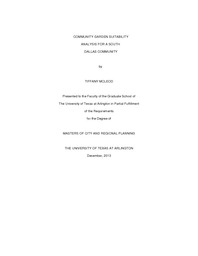| dc.contributor.author | Mcleod, Tiffany | en_US |
| dc.date.accessioned | 2014-03-12T23:50:58Z | |
| dc.date.available | 2014-03-12T23:50:58Z | |
| dc.date.issued | 2014-03-12 | |
| dc.date.submitted | January 2013 | en_US |
| dc.identifier.other | DISS-12460 | en_US |
| dc.identifier.uri | http://hdl.handle.net/10106/24123 | |
| dc.description.abstract | Community gardens have been proposed as a solution to combat the ongoing and escalating food desert problem in low-income communities. As planners, community leaders and residents look to implement this solution and convert vacant property into gardens they need to be aware of the potential conflicts that can arise when the area starts to develop. This paper offers an analysis tool and uses it to determine vacant sites that are appropriate for community gardens in a particular South Dallas neighborhood that do not conflict with the future development of the area. It also identifies the grocery store gap in the area. Finally the paper provides policy recommendations to both guide the conversion of vacant parcels to community gardens and attract grocery store development. | en_US |
| dc.description.sponsorship | Grodach, Carl | en_US |
| dc.language.iso | en | en_US |
| dc.publisher | Urban & Public Affairs | en_US |
| dc.title | Community Garden Suitability Analysis For A South Dallas Community | en_US |
| dc.type | M.C.R.P. | en_US |
| dc.contributor.committeeChair | Grodach, Carl | en_US |
| dc.degree.department | Urban & Public Affairs | en_US |
| dc.degree.discipline | Urban & Public Affairs | en_US |
| dc.degree.grantor | University of Texas at Arlington | en_US |
| dc.degree.level | masters | en_US |
| dc.degree.name | M.C.R.P. | en_US |

